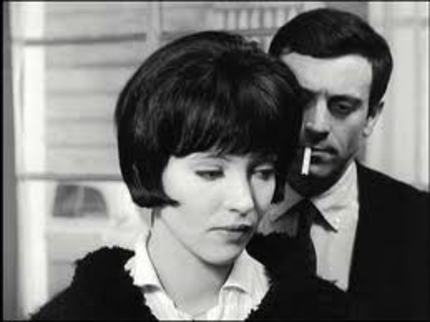Melbourne Cinematheque Review: VIVRE SA VIE Is Godard, Karina Perfection

Welcome back to my ongoing coverage of the Melbourne Cinematheque's fantastic program for 2013. Here I will be reviewing the first film per season (month). This month I took a look at Vivre Sa Vie (My Life to Live) (1962), the first of the films from the eponymous Jean-Luc Godard. For the month of March I introduced one of German's works, which can be found here. I hope you saw something from this season!
Running from April 3-17, the retrospective of Godard's films clamber through genre and the unconventional, turning the medium of cinema on itself with pseudo-documentary and stoic genre pieces. The enfant terrible of the nouvelle vague, Godard's work is uncompromising in his unique and often frustrating visions and statements on society and film.
The program is thus composed of the April 3rd double-bill Vivre Sa Vie and 2 or 3 Things I Know About Her; the April 10 double-feature, which I suggest nobody miss, the iconic ultra-cool sci-fi noir Alphaville followed by essay piece Numero Deux; and finally the April 17 double-bill, which features the more recent Notre Musique and finishing with the self-reflective Prenom Carmen that stars Godard himself.
Vivre Sa Vie could be seen as a culmination of all of the aforementioned films. It wildly swings between tone and style but remains essentially a genre piece told in twelve parts. Without the heavy-handedness later developed and derided (admired) in his later career, here Godard plays with conventions in a more natural and accepting sense.
This easily makes Vivre Sa Vie one of his more accessible films. Of course it is still heavily layered with overt symbolism and the protagonist is a vehicle to express Godard's many views of the contemporary, pop culture and cinema itself, but Anna Karina is just perfect as the character of Nana; the viewer really feels for her, and thus she anchors Godard's auteur style and grounds the whole proceeding.
Vivre Sa Vie is a memorable film; there are so many iconic and beautifully inventive scenes that after one viewing will remain with you forever. It has a level of romanticism not as evident in his other works and there is a tragic poetry to the way it plays out. The pacing is perfect in this regard.
Anna Karina and Godard truly are a perfect match, without direction or sense of manipulation, Karina faultlessly conveys all of Nana's feelings through her expressions. Not much is really said, and if it is, it is drowned out by Karina's naturalistic beauty and non-verbal communication. Comparable to her other films with Godard, she plays Nana with great conviction in the face of inevitable tragedy. She is a doomed figure and each scene feels ominous and foreboding. She is a woman in trouble and her descent into prostitution is a hard one to watch, although one cannot simply look away and Godard knows this. He infuses a cynicism in the message that Nana 'gives herself to herself,' this is not an empowerment and never resolves as Nana always belongs to her pimp.
Godard's style, film references and nouvelle vague conventions are used practically to relate to Nana, from her weeping which viewing Dreyer's The Passion of Joan of Arc in a cinema to Baudelaire's poem that she reads aloud and of course Godard's collaboration with cinematographer Raoul Coutard and the way they bring each urban scene to vivid life. Godard is also a very cheeky man and this is quite evident in Vivre Sa Vie, in particularly his inclusion of in-jokes such as fellow auteur Francois Truffault's film Jules and Jim, which plays in a theatre in the film.
Vivre Sa Vie is a truly great film, it is the portrait of a woman; the demarcation of prostitution and freedom and Anna Karina is simply perfect in it.
Please check the Melbourne Cinematheque guide for a more detailed account of the films comprising Godard's marvelous season. I will return in late April for 'Restless Objectivity - The Cinema of Otto Preminger' and the hyper noir The Man With The Golden Arm. See you then!







